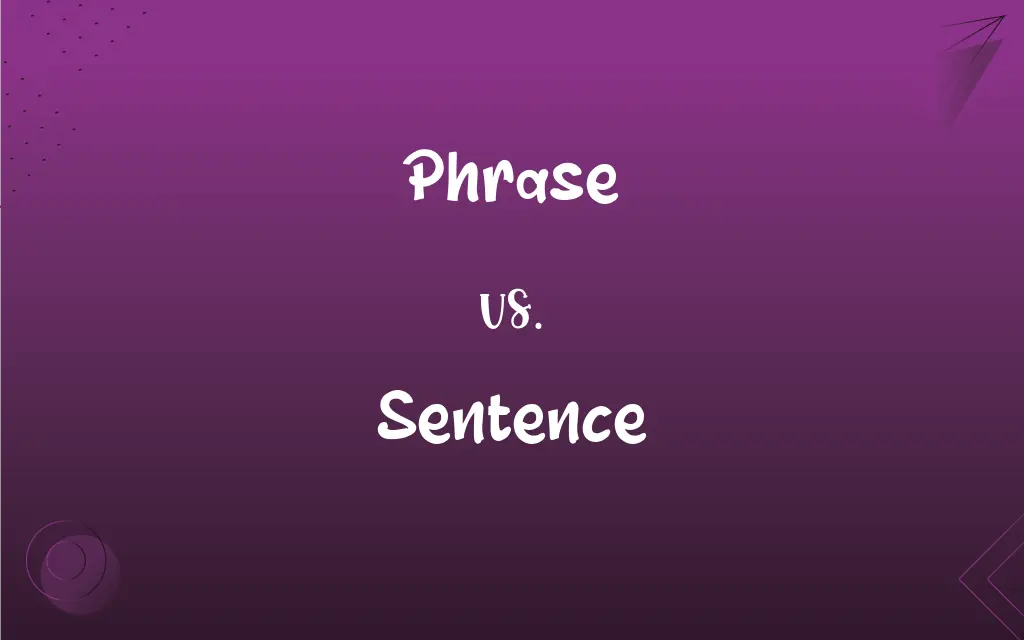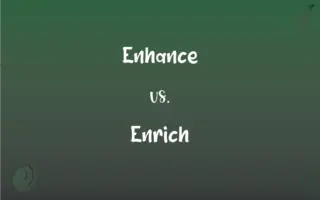Phrase vs. Sentence: What's the Difference?
Edited by Harlon Moss || By Janet White || Updated on November 1, 2023
A phrase is a group of words acting as a single unit in a sentence; a sentence is a set of words expressing a complete thought, usually containing a subject and a predicate.

Key Differences
A phrase is a collection of words that may lack a subject, a verb, or both, and it often acts as a single part of speech in a sentence. Conversely, a sentence is a grammatical unit that must contain a subject and a predicate and conveys a complete thought, representing a statement, question, exclamation, or command.
Phrases are integral components of sentences, providing additional information and context without necessarily forming a complete thought. Sentences, on the other hand, are independent and can stand alone, expressing complete ideas, feelings, or actions.
The function of a phrase within a sentence can vary; it can act as a noun, verb, adverb, adjective, or preposition, depending on its construction and context. In contrast, a sentence serves to communicate a statement, question, command, or exclamation and must have proper grammatical structure.
Phrases can be very brief or quite long, but they do not have the independence of conveying a full idea or statement. Sentences, however, are structured to convey full meanings and can be complex, compound, simple, or compound-complex, depending on their construction.
Phrases usually serve to provide specific details, clarify meaning, or add embellishment to the sentences they are part of. Sentences, meanwhile, serve as the foundational building blocks of coherent and organized written and spoken language, allowing for clear communication of thoughts and ideas.
ADVERTISEMENT
Comparison Chart
Definition
A group of words acting as a single unit without conveying a complete thought.
A group of words expressing a complete thought, having a subject and a predicate.
Component
Can be a component of a sentence.
Can contain multiple phrases.
Independence
Cannot stand alone as it does not convey a complete thought.
Can stand alone as it conveys a complete thought.
Structure
May lack a subject, a verb, or both.
Must contain a subject and a predicate.
Function
Acts as a single part of speech within a sentence.
Communicates a statement, question, command, or exclamation.
ADVERTISEMENT
Phrase and Sentence Definitions
Phrase
A sequence of words intended to have meaning.
Piece of cake is a phrase used to describe something easy.
Sentence
A set of words that is complete in itself, typically containing a subject, verb, and object.
The dog fetched the ball. is a complete sentence.
Phrase
A group of words without a subject and predicate.
Under the weather is a phrase meaning feeling ill.
Sentence
A word, or group of words, that must contain a subject and predicate.
She dances gracefully. is a sentence with a subject and a predicate.
Phrase
A combination of words acting as a single unit in the syntax of a sentence.
Breaking the ice is a phrase denoting the act of overcoming initial social awkwardness.
Sentence
A grammatical unit that is syntactically independent and has a subject that is expressed or, as in imperative sentences, understood and a predicate that contains at least one finite verb.
Phrase
A sequence of words that have meaning, especially when forming part of a sentence.
Sentence
The penalty imposed by a law court or other authority upon someone found guilty of a crime or other offense.
Phrase
A characteristic way or mode of expression
An apt turn of phrase.
Sentence
(Archaic) A maxim.
Phrase
A brief, apt, and cogent expression
The phrase "out of the frying pan and into the fire.".
Sentence
(Obsolete) An opinion, especially one given formally after deliberation.
Phrase
(Music) A short passage or segment, often consisting of four measures or forming part of a larger unit.
Sentence
To impose a sentence on (a criminal defendant found guilty, for example).
Phrase
A series of dance movements forming a unit in a choreographic pattern.
Sentence
(dated) The decision or judgement of a jury or court; a verdict.
The court returned a sentence of guilt in the first charge, but innocence in the second.
Phrase
To express orally or in writing
The speaker phrased several opinions.
Sentence
The judicial order for a punishment to be imposed on a person convicted of a crime.
The judge declared a sentence of death by hanging for the infamous child rapist.
Phrase
To divide (a passage) into phrases.
Sentence
A punishment imposed on a person convicted of a crime.
Phrase
To combine (notes) in a phrase.
Sentence
(obsolete) A saying, especially from a great person; a maxim, an apophthegm.
Phrase
To make or express phrases.
Sentence
(grammar) A grammatically complete series of words consisting of a subject and predicate, even if one or the other is implied, and typically beginning with a capital letter and ending with a full stop or other punctuation.
The children were made to construct sentences consisting of nouns and verbs from the list on the chalkboard.
Phrase
(Music) To perform a passage with the correct phrasing.
Sentence
(logic) A formula with no free variables.
Phrase
A short written or spoken expression.
Sentence
(computing theory) Any of the set of strings that can be generated by a given formal grammar.
Phrase
(grammar) A word or, more commonly, a group of words that functions as a single unit in the syntax of a sentence, usually consisting of a head, or central word, and elaborating words.
Sentence
(obsolete) Sense; meaning; significance.
Phrase
(music) A small section of music in a larger piece.
Sentence
(obsolete) One's opinion; manner of thinking.
Phrase
(archaic) A mode or form of speech; diction; expression.
Sentence
A pronounced opinion or judgment on a given question.
Phrase
(dance) A short individual motion forming part of a choreographed dance.
Sentence
To declare a sentence on a convicted person; to condemn to punishment.
The judge sentenced the embezzler to ten years in prison, along with a hefty fine.
Phrase
(transitive) To express (an action, thought or idea) by means of particular words.
I wasn't sure how to phrase my condolences without sounding patronising.
Sentence
To decree, announce, or pass as a sentence.
Phrase
To perform a passage with the correct phrasing.
Sentence
(obsolete) To utter sententiously.
Phrase
To divide into melodic phrases.
Sentence
Sense; meaning; significance.
Tales of best sentence and most solace.
The discourse itself, voluble enough, and full of sentence.
Phrase
A brief expression, sometimes a single word, but usually two or more words forming an expression by themselves, or being a portion of a sentence; as, an adverbial phrase.
"Convey" the wise it call. "Steal!" foh! a fico for the phrase.
Sentence
An opinion; a decision; a determination; a judgment, especially one of an unfavorable nature.
My sentence is for open war.
That by them [Luther's works] we may pass sentence upon his doctrines.
Phrase
A short, pithy expression; especially, one which is often employed; a peculiar or idiomatic turn of speech; as, to err is human.
Sentence
A philosophical or theological opinion; a dogma; as, Summary of the Sentences; Book of the Sentences.
Phrase
A mode or form of speech; the manner or style in which any one expreses himself; diction; expression.
Thou speak'stIn better phrase and matter than thou didst.
Sentence
In civil and admiralty law, the judgment of a court pronounced in a cause; in criminal and ecclesiastical courts, a judgment passed on a criminal by a court or judge; condemnation pronounced by a judicial tribunal; doom. In common law, the term is exclusively used to denote the judgment in criminal cases.
Received the sentence of the law.
Phrase
A short clause or portion of a period.
Sentence
A short saying, usually containing moral instruction; a maxim; an axiom; a saw.
Phrase
To express in words, or in peculiar words; to call; to style.
Sentence
A combination of words which is complete as expressing a thought, and in writing is marked at the close by a period, or full point. See Proposition, 4.
He fills, he bounds, connects, and equals all.
A king . . . understanding dark sentences.
Phrase
To use proper or fine phrases.
Sentence
To pass or pronounce judgment upon; to doom; to condemn to punishment; to prescribe the punishment of.
Nature herself is sentenced in your doom.
Phrase
An expression forming a grammatical constituent of a sentence but not containing a finite verb
Sentence
To decree or announce as a sentence.
Phrase
A short musical passage
Sentence
To utter sententiously.
Phrase
An expression whose meanings cannot be inferred from the meanings of the words that make it up
Sentence
A string of words satisfying the grammatical rules of a language;
He always spoke in grammatical sentences
Phrase
Put into words or an expression;
He formulated his concerns to the board of trustees
Sentence
(criminal law) a final judgment of guilty in a criminal case and the punishment that is imposed;
The conviction came as no surprise
Phrase
A small group of words standing together as a conceptual unit.
The phrase kick the bucket conveys the concept of dying.
Sentence
The period of time a prisoner is imprisoned;
He served a prison term of 15 months
His sentence was 5 to 10 years
He is doing time in the county jail
Phrase
A segment of language with idiomatic or propositional meaning.
The phrase hit the nail on the head means to describe exactly what is causing a situation or problem.
Sentence
Pronounce a sentence on (somebody) in a court of law;
He was condemned to ten years in prison
Sentence
A grammatical unit consisting of a set of words that express a complete thought.
The sentence The cat sat on the mat. conveys a complete idea.
Sentence
A coherent set of words expressing an assertion, a question, a command, or an exclamation.
The sentence What a beautiful sunset! expresses an exclamation.
Sentence
A string of words satisfying the grammatical rules of a language.
It is raining heavily. is a grammatically correct sentence.
FAQs
Is a verb necessary in a Phrase?
No, a phrase may lack a subject, a verb, or both.
What constitutes a Sentence?
A sentence is a set of words that express a complete thought, typically containing a subject and a predicate.
Can a Phrase stand alone?
No, a phrase cannot stand alone as it does not convey a complete thought.
Does every Sentence convey a complete thought?
Yes, every sentence must convey a complete thought.
Can Phrases be part of complex Sentences?
Yes, phrases can be components of complex sentences to provide additional information.
What is a Phrase?
A phrase is a group of words acting as a single unit in a sentence, without conveying a complete thought.
Is proper grammatical structure mandatory in a Sentence?
Yes, a sentence must have proper grammatical structure to convey a clear meaning.
Do Phrases add meaning to Sentences?
Yes, phrases can clarify meaning and add detail to sentences.
Can a Phrase be long?
Yes, a phrase can be very brief or quite long, depending on its construction.
Can a Sentence contain multiple Phrases?
Yes, a sentence can contain multiple phrases which add detail and context.
What is the minimum requirement for a Sentence?
A sentence requires, at a minimum, a subject and a predicate.
Can the function of a Phrase vary within a Sentence?
Yes, depending on its construction and context, a phrase can act as various parts of speech within a sentence.
Can a Sentence be a question?
Yes, a sentence can be structured to ask a question.
How does a Phrase differ in function from a Sentence?
A phrase provides specific details within a sentence, while a sentence communicates complete thoughts or ideas.
Is a Sentence a foundational building block of language?
Yes, sentences serve as foundational building blocks for coherent written and spoken language.
About Author
Written by
Janet WhiteJanet White has been an esteemed writer and blogger for Difference Wiki. Holding a Master's degree in Science and Medical Journalism from the prestigious Boston University, she has consistently demonstrated her expertise and passion for her field. When she's not immersed in her work, Janet relishes her time exercising, delving into a good book, and cherishing moments with friends and family.
Edited by
Harlon MossHarlon is a seasoned quality moderator and accomplished content writer for Difference Wiki. An alumnus of the prestigious University of California, he earned his degree in Computer Science. Leveraging his academic background, Harlon brings a meticulous and informed perspective to his work, ensuring content accuracy and excellence.







































































